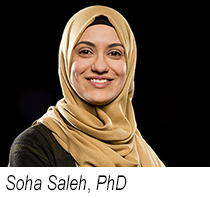Exploring Brain and Muscle Connection in MS
Your Support Helps People with MS Stay Employed, Live to the Fullest
Three days after turning 25, while a student at Seton Hall University, Michaele Clayborne-Crosby, lost vision in her right eye. Years of unexplained symptoms suddenly came into focus.
Doctors diagnosed multiple sclerosis. After graduating, Michaele held challenging positions at several large companies while receiving treatment. Later in her career, though, she lost her job due to a flare-up of symptoms. “I had difficulty processing information,” she recalls, “and that made it very hard to do my job.”
Michaele looked for opportunities to participate in research. “Everyone told me to go to Kessler Foundation because they do research in MS,” she remembers. Michaele has participated in many Kessler Foundation studies, including innovative research examining the relationship between physical and cognitive symptoms that contribute to reduced quality of life for people with MS.
 Leading this area of research is Soha Saleh, PhD, research scientist in Kessler Foundation’s Center for Mobility and Rehabilitation Engineering Research. “Using mobile imaging technologies, we are recording brain activation while an individual performs two activities at the same time—walking and doing mental math. We call this dual-tasking. My team and I are looking at the connections between brain and muscle, and we are measuring the effort required to perform these dual tasks,” says Dr. Saleh.
Leading this area of research is Soha Saleh, PhD, research scientist in Kessler Foundation’s Center for Mobility and Rehabilitation Engineering Research. “Using mobile imaging technologies, we are recording brain activation while an individual performs two activities at the same time—walking and doing mental math. We call this dual-tasking. My team and I are looking at the connections between brain and muscle, and we are measuring the effort required to perform these dual tasks,” says Dr. Saleh.
“The study opened my eyes to my cognitive issues and how difficult it is for me to do two things at once,” Michaele admits. “I realized that I need to compensate for my challenges in order to achieve my life goals.”
Michaele’s experience reflects the study’s findings, according to Dr. Saleh. People with MS walked more slowly, had slower information processing speeds, and greater difficulty performing two tasks at once compared to those without MS.
“The next step is to find ways to lessen the challenges of dual tasking by boosting the connection between brain and muscle, bringing us closer to our goal of improving the lives of individuals with MS.” —Soha Saleh, PhD
Michaele is now back at work after her career setback following a flare-up of her MS. "I'm in a whole other place because of Kessler Foundation's research and the donors who support it," she says. With your support, Kessler Foundation researchers can research ways to help people with MS, like Michaele, manage their symptoms so they can stay employed.
